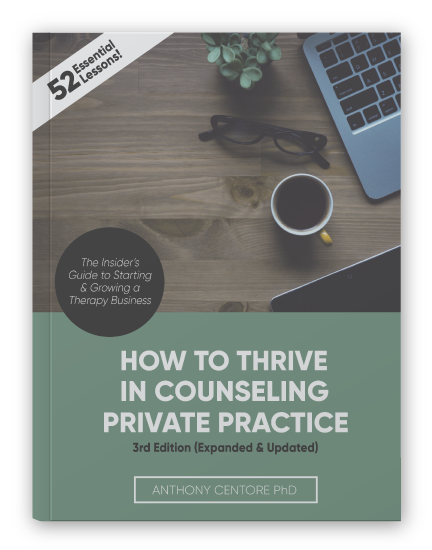
Building rapport with clients from a distance can be a challenge. However, it’s by no means impossible.
Here are several techniques and principles for building rapport without a hug or a handshake:
Wait: Looking for online counseling services? You’re one page away. Simply, skip this article and visit our online counseling services page.
1. Active listening
Active listening is of primary importance in all counseling, and it is even more important in online counseling where physical communication is absent. Counselors need to pay very close attention to the words and emotions of the client, and convince the client that he or she is being heard and understood.
2. Verbally engaging
Research shows that rapport increases with counselor verbosity. The more you verbally engage the client in dialogue (rather than just listening), the better rapport will be.
3. Using less encouragers
Research shows that encouraging statements such as ‘uh huh,’ ’yes’ and ‘go on’ do little or nothing for building rapport.
4. Emotionally engaging
Successful online counselors emotionally engage the client. That is, they are proficient at helping the client move from a cognitive to an emotional emphasis of their story.
5. Asking open-ended questions
Who, where, what, when and how (not why). Open-ended questions will require your client to give in-depth responses that promote dialogue and deepen the relationship.
6. Doing less interpretation
The counselors ‘expert’ interpretations of the client’s situation rarely seem to increase client-counselor rapport. Instead, empathizing with the client’s emotions is still a more effective approach for rapport building.
7. Increasing self-disclosure
With online counseling, your clients do not have the ability to learn about you from the frames on your walls, your office décor, your car in the parking lot, the pictures of your family on your desk, etc. Therefore, it is all the more important to humanize yourself by telling the client some information about who you are and what you are about.
8. Allowing more silence
Research shows the greatest amount of rapport is found in counseling relationships where between 4% and 20% of the session time is spent in silence. Volume and pace. A client who speaks softly will appreciate a counselor who also speaks softly. Likewise a client who speaks loud or quickly will appreciate a counselor who can keep pace.
9. Emulating the client’s speech
Having the flexibility to use words, phrases and metaphors familiar to the client is important for rapport building. Listen carefully to the language the client uses, and attempt to adopt some words, phrases, and images the client feels comfortable with.
10. Finding common ground with opinions or beliefs
To help increase rapport, validate something the client knows to be true, before leading him to consider other possibilities. This is less damaging to rapport than challenging the client’s beliefs alone. Motivational interviewing shows us that the most likely result of too many direct challenges is defensiveness. However, do not compromise your integrity or pretend to believe in something you do not. As Thomas Jefferson once said, “In matters of principle, stand firm like a rock; in matters of opinion flow like a river.”
11. Breathing
We seldom think about our voluntary and involuntary inhaling and exhaling of air, but the synchronization of breathing is said to be one of the oldest rapport building techniques on record. In some variations of tantra yoga, to achieve a spiritual merging two individuals hold each other and breathe together until the apparent barriers separating them drop away and the experience is one of unity.
In counseling it is nowhere as mystical (or physical), but breathing at the pace of the client may put the client at ease, which could promote rapport.
12. Using humor
One thing about phone and email conversations is they are often right down to business. Somehow ‘small talk’ and social graces need not apply. Therefore, make an effort to slow and soften your conversational approach, and even try to work some humor into the dialogue. This personal touch may go a long way in helping to build relationship with clients.
13. Anticipating needs
This might be a bit harder to do at a distance than in person. While a nurse can easily see that an uncomfortable patient needs a pillow or a dose of medication, you will be hard pressed to anticipate needs. But if you can pull this off you will be on a good path to building rapport. Therefore, consider the needs of your client. Could your client use a book to read between sessions? Does she need help setting up an appointment with a medical doctor? Did you mention a website the client can visit for more information? Is there any other gesture you can make to help the client feel genuinely cared for?
14. Providing stability
Your client needs to know that you will be a source of stability amidst his or her times of crisis. With email, proofread your letters to make sure they are supportive and communicate a sense of security. While on the phone pay close attention to the pace and timbre of your voice. Make sure you always seem calm and controlled.
15. Providing a picture
Unless you are using videoconference and already have an image, provide the client a picture of yourself at the beginning of the counseling relationship (or two?).
Research shows that a picture presented early on helps to increase rapport. However, providing a picture after rapport has developed can lower it (because it distorts what the client thought you look like). Therefore, be sure to provide a picture at the beginning of the counseling relationship.
16. First Impressions
It is said people form a lasting impression of us within the first three minutes. In clinical research, this is part of the ‘Halo effect’ phenomena. Therefore, be sincere, personable and professional, especially at the beginning of the counseling relationship—and then keep it up!
 Dr. Anthony Centore is CEO of Thriveworks, is Private Practice Consultant for the American Counseling Association, and Author of “How to Thrive In Counseling Private Practice.” Learn more at https://twx.atlantacounseling.com/counseling-private-practice-book/
Dr. Anthony Centore is CEO of Thriveworks, is Private Practice Consultant for the American Counseling Association, and Author of “How to Thrive In Counseling Private Practice.” Learn more at https://twx.atlantacounseling.com/counseling-private-practice-book/
Looking for help starting or growing a private practice? We can help! Learn more at https://twx.atlantacounseling.com/private-practice
Let’s keep in touch! Sign up to receive our newsletter:
Start a Relationship with An Exceptional Counselor
- Skilled and caring professional counselors
- Accepting all major and most insurances
- High-touch customer service & premium benefits
- Same- or next-day appointments
- Ultra-flexible 23.5hr cancellations













Just To Know, The Origin Of The Term Rapport To Describe Relatioship Building